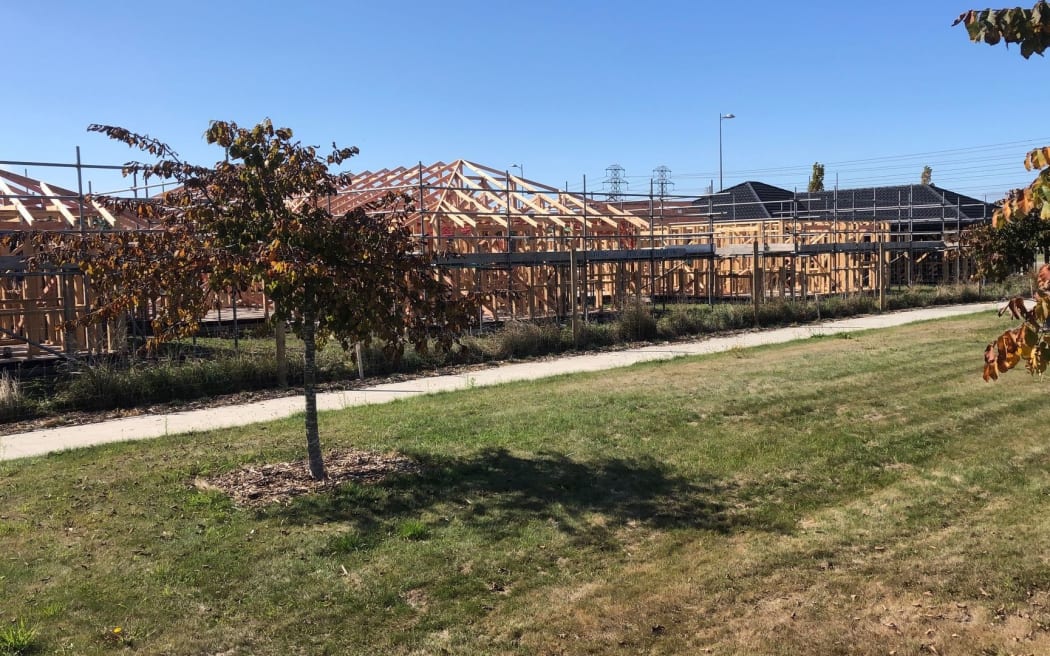A new report forecasts a crash in the numbers of houses to be built over the next three years, but builders say they are busier than usual.

Photo: RNZ
It predicts the numbers will fall substantially as banks tighten lending.
The value of residential building is tipped to hit just $13.4 billion in 2023 - about 43 percent down from last year.
The National Construction Pipeline Report 2020 was commissioned by Ministry of Business, Innovation and Employment (MBIE).
It forecasts a decrease in new dwelling consents of more than 37,000 in 2019, to an average of 26,800 per year for the next six years.
Residential building makes up the bulk of construction activity and is typically the hardest hit by changing economic conditions.
Construction Industry Council chair Graham Burke told Morning Report the forecast was counter-intuitive because people on the ground were saying they have never been this busy.
"Builders are saying they are booked up for all of next year and some into the following year."
He said for building to come to a halt would take something significant happening.
"There's plenty the government can do to make sure that consumer confidence remains. The government are building more houses themselves than we've seen in decades; that's a small part of the industry, we do need private houses to continue."
Burke said there was a shortage of materials from overseas, which are expected to get tighter over the next quarter.
"There's certainly nothing to suggest the kind of drops that are being forecast in this report.
"Any business has to be prudent and we are in volatile times."
He said there were a record number of apprentices but they are "barely enough to cover the retiring baby boomers".
The government needed to do more to stimulate the private market, he said as the industry waits for an announcement regarding more rentals and first homes in early 2020.
"We wouldn't want to see a major tightening of monetary policy because that could have an adverse effect."
Burke said the Labour government needed to look at how Australia maintained consumer confidence following the global financial crisis in 2008.
"Anything to improve the supply of land quickly would be a very good step. We know there is a real shortage of sections, especially in Auckland, and sections ready to go to market, so getting that infrastructure in place would be a major help.
"The supply and cost of land is probably the biggest problem holding the prices up."
Burke said for those looking at building their house: "Find a good builder and book them in soon."
The report finds that despite the forecast, demand for residential housing remains strong.
"There is steady pipeline of demand and latest data show new home consents are currently at a 46-year high," MBIE Building System Performance general manager John Sneyd said.
"Infrastructure construction is expected to increase, particularly in Auckland and Waikato/Bay of Plenty. Infrastructure is the only construction area forecasted to see sustained growth, reaching $10.1b in 2025- up 6.3 percent on 2019."
The report forecasts:
- Compared to 2019, Auckland is expected to see a reduction in total construction activity of 16 percent to $14.3b by the end of 2025. Waikato/Bay of Plenty is forecast to decrease by 18 per cent to $5.5b, Wellington by 35 percent to $2b, Canterbury by 57 percent to $3b, Otago by 33 percent to $1.8b and Rest of New Zealand by 29 percent to $4.7b.
- Non-residential construction activity (including hotels, offices, retail outlets and industrial buildings) is forecasted to drop 42 percent nationally from $10b in 2019 to $5.8b in 2022 before recovering to $7.4b in 2025.
- Multi-unit dwellings accounted for 41 percent of all dwellings consented in 2019. Multi-unit dwellings are anticipated to be hardest hit by the Covid-19 pandemic, particularly apartments, and these are forecast to account for 32 percent of all dwellings consented in 2022.






